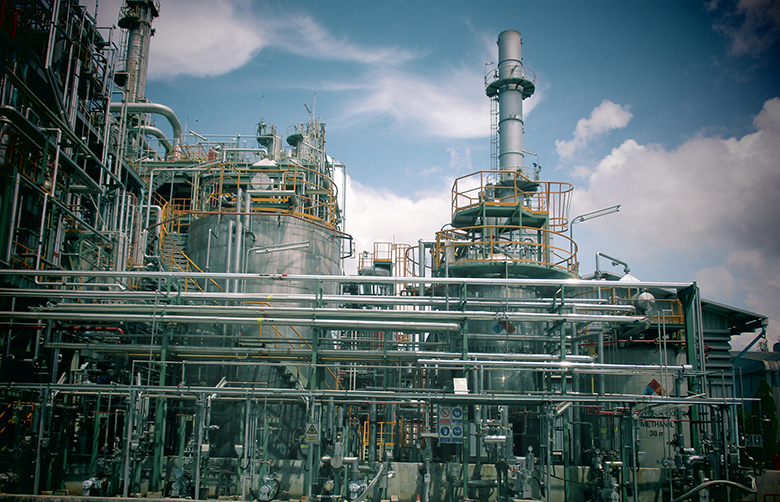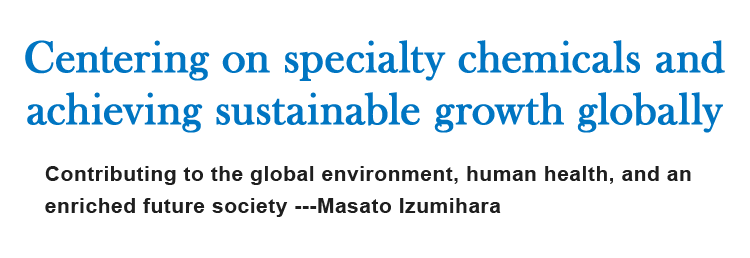
President & CEO
Masato Izumihara
Born in Yamaguchi prefecture, he graduated from the University of Tokyo Faculty of Law and joined Ube Industries (now UBE). After serving as a director and other positions, he was named president&CEO in 2019. Under the new name, “UBE Corporation,” he leads the transformation of its business structure by growing specialty chemicals.
--- In April 2022, you changed your company name from "Ube Industries" to "UBE" Would you tell me the reasons you did it and thoughts behind the new name?
Our company started 125 years ago, way back in 1897 as a coal mining company. Using that as our foundation, we eventually expanded our business into the fields of machinery, cement, and chemical fields. During World War II, all four of our businesses merged under the name "Ube Industries, Ltd." This name stems from Ube City, a city in Yamaguchi prefecture, the location of our head office.
However, as times changed, we also had to make some changes as well. Each branch had to operate almost independently from each other in order to survive. Thus, in 1990, we split off our machinery business from the main company. And now, we have established a joint venture together with Mitsubishi Materials in our new company, Mitsubishi UBE Cement Corporation. Since we have become a company dedicated to chemicals, we have also taken this opportunity to change our company name to UBE Corporation as well. (Pronounced U-B-E)
We have also taken this opportunity to establish our brand slogan as "Transform Tomorrow Today." Our company has survived through the years by constantly evolving our business in response to changes in industrial structures. Staying true to our roots, we aim to continue to change by moving towards globalization and transition from a business that requires a high energy burden into a specialty chemicals enterprise that can contribute towards solving important environmental problems. We have chosen the word "transform" to express that desire.

UBE Group (Thailand) Bangkok Office
--- What does your global growth strategy look like?
We are globalizing our business at a rapid pace in order to secure our position in the emerging, high-growth markets. Throughout all of our group's companies, 60% of our chemical sales already come from foreign markets, with a third of our chemical sales being for Asian countries outside of Japan. With Asia predicted to experience unprecedented growth in the near future, it is simply a market upon which we place great importance.
In order to continue to grow, we are strengthening our global manufacturing operation to establish optimal facilities that are able to manufacture products tailored to the specific needs of that location.
In accordance with our long-term vision, we implemented a new mid-term management plan from FY2022. Under this plan, we consider the next three years a preparation period for future growth, during which we plan to make large-scale investments regarding our plants and equipment. The total investment will amount to 162 billion yen, 1.5 times the amount invested over the past 3 years of our previous mid-term management plan. Half of this investment will go towards our specialty chemicals business, with a focus on fine chemicals, high performance coatings, composites such as nylon, functional materials like polyimide, and pharmaceutical products.
With the global market being how it is, we cannot expect to see continuous growth if we only rely on general-purpose commodities. The process requires an enormous amount of energy as it stands, so we can't expect to survive if we only focus on strategies that are solely based on cutting costs or increasing scale. As stated previously, an important part of our plan is shifting towards a specialty chemicals business. This will not only contribute to our growth as a company, but also other environmental issues such as the reduction of greenhouse gas (GHG) emissions.

--- What is the current progress of your investment plans in Asia?
In Asia, one of our major production sites is a group of plants in Thailand, and over the next three years, investment projects to strengthen our specialty chemicals business will be concentrated there. Our second set of facilities for production of PCD (polycarbonate diol), a raw material for high-grade polyurethane, is up and running, and further expansion of a third set of facilities is currently underway. We plan to begin operation of these facilities in 2023's fiscal year, which will increase our annual output of PCD from 8000 to 12000 tons. Additionally, a production facility for PUD (polyurethane dispersion), a material made from PCD, is also in the planning stages. PUD is an environmentally friendly, solvent-free, water-based drainage coating that has been increasingly in demand, particularly in China and other Asian countries.
Furthermore, in order to meet growing demand in the automobile and electronics industries, we have also begun construction of a high-performance compounding (that means nylon) facility, with plans to begin operations at the beginning of 2024.
We have been doing business in Thailand since the 1990s, so we are intimately familiar with the region. I personally took a business trip to Thailand this past October for the first time in 3 years. The people were very friendly, hardworking, and talented, and I have the utmost respect for them as our reliable partners.
Thailand is also home to our R&D organization, UBE Technical Center (Asia) Limited, where we develop product grades based on the needs of the region. We will continue to use Thailand as our main base of operations in Asia and respond to the growth of Asia's market by expanding our manufacturing of specialty chemical products, which have become increasingly valuable.
--- Outside of Asia, can you tell us more about your plans for a C1 chemicals business in America?
As part of our mid-term management plan, we announced our investment plan to use local materials for production by establishing C1 chemicals chain plants in America and Europe.
With regard to America, we have already announced our plans to select the state of Louisiana as a candidate for the construction site and began basic design this past July. These plants will focus on the production of DMC (dimethyl carbonate) and EMC (ethyl methyl carbonate). DMC and EMC have risen in demand as vital components for producing the lithium-ion batteries used in electric vehicles and other next-generation vehicles, as well as for use in developer solutions for manufacturing semiconductors. Aside from our company, these products are currently only produced in China.


PCD production facilities in operation in Thailand (Phases I and II)
With the need to promote use of local materials for production in America in mind, we are moving forward with plans to establish a plant there. We are currently conducting a feasibility study to confirm the profitability of this investment. We will make our final decisions in the next fiscal year and aim to begin operations in the second half of the fiscal 2025. As a downstream development, we are planning the production of PCD using DMC as a raw material.
In Europe, we are considering building a new DMC production plant using environmentally friendly green CO (carbon monoxide) as a basic raw material and will be accelerating global expansion of the C1 chemicals chain.
--- Can you tell us more about the challenges you'll face and your business policy as you move towards 2030?
As we head towards 2030, we aim to become a specialty chemicals enterprise that contributes to the health and well-being of people and the environment, and to the creation of a better world for everyone. We also aim to reduce greenhouse gas emissions by 50% (compared with 2013) by 2030 as part of our carbon-neutral 2050 challenge, and have established a mid-term goal of increasing the ratio of consolidated net sales of environmentally friendly products and technologies to 60%.
As we seek to achieve this goal, one major focus will be promoting an environment of diversity and inclusion, in order to create a company culture more innovative than ever before.
In order to move forward with a unified growth strategy and environmental policy, we will continue to anticipate future needs and societal changes, and fearlessly reinvent the structure of our business as encapsulated by the word "transform."
In making these goals a reality, we view Asia as an essential market and manufacturing base. We will continue to contribute to regional development through our business.




